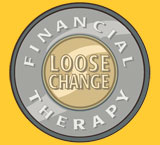Sitting shoulder to shoulder on plastic drawn lawn chairs in the cozy basement of the Toronto Healing Arts Centre, 20 strangers are asked to share one word that captures what brought them here today. “Friendship,” says one man. “Help.” “Anxiety.” “Support,” others pipe in. Oddly, no one mentions the one word at the top of my mind: Money.
This, after all, is Loose Change Financial Therapy, a financial consultancy cum-support-group that offers to help the budgetarily befuddled approach their money problems in holistic, creative ways. Providing one-on-one and group therapy sessions, the Toronto outfit is 'where money and feelings meet.'
It's not all touchy-feely-chit-chat: for $100, clients get 90 minutes with a financial planner for nuts-and-bolts money advice: debt management, tax planning, budgeting. Where Loose Change differs from a credit counseling agency or your neighborhood bank branch is that it encourages clients to explore their 'personal money story' and discover how to keep cash from emotionally ruining their lives.
“Putting their finances in 'the backseat rather than the driver's seat of life' requires people to delve into all kinds of fears and stigmas surrounding money,” says Amanda Mills, an earth woman with a soothing manner who has worked as both a crisis counselor and a business manager.
“Some clients,” she says, “might be convinced they can't balance their books because they're bad at math. Others feel they're destined for bankruptcy like their parents.
Ms. Mills says anyone, even someone making $10,000 a year can be in control financially. The key is to prevent surprises that can turn your life upside down, like bouncing a rent cheque or having an empty bank account. Even more important is to figure out why you'd allow such problems to occur in the first place.
Ms. Mills, 50, has seen it many times. Back in the 1980's, she was the business manager of a struggling theatre company. “Tired of seeing money run things,” she left and launched Artbooks, a financial management firm for the arts. Seventeen years of doing tax returns and financial planning for struggling creative types have shown her, she says, how money tugs at the heartstrings.
“There has never really been an appropriate place for our financial angst,” Loose Change literature observes. “Crying in the accountant's office is embarrassing and often finances are not a therapist's strong suit.”
Ms. Mills saw a need, and an opportunity. So two years ago she founded Loose Change. Aside from individual sessions, the company runs a range of workshops from Financial Group Therapy ('a collective journey through the financial realms of the psyche') to the Money Mastery Workshops that offers more practical advice. Next year Ms. Mills plans to take the program to Ottawa.
Tonight's Freelancers' Financial Tune-up session has drawn artists, writers and entrepreneurs to pay $275 for a 3 day workshop. “Society acts as if emotions have nothing to do with money,” Ms. Mills tells us. “But if you look at any money management books, it's equal parts emotions and pragmatics.”
Clarissa Chandler, tonight's keynote speaker introduced as a strategic planner, takes the floor. She begins by explaining that money is an emotional journey. “Do you realize that love and money are the same energies?” she asks, her arms outstretched as if offering a group hug. A few nod. Most stare in awe (or perhaps confusion).
Ms. Chandler shares with us her personal tribulations launching a consulting business. She found she couldn't bear to keep a record of the time she spent working for a client, resenting such a pedestrian metric. “It's my dream, my energy, my time,” she says. To escape the watching-the-clock syndrome, Chandler now burns a candle when she works, knowing she'll have put in eight hours once it's out.
But that created another dilemma: how to explain to Canada Revenue that all that beeswax was a legitimate business write-off. Filing tax returns felt really 'exposing,' Ms. Chandler says. “My interior process became public knowledge.”
She advises us to look at bookkeeping and filing as ways to organize our energy, which reward us by bringing us money, which in turn, motivates further organization. The key to making mundane business tasks bearable, she says, is to pick satisfying assignments and contracts that further our career goals. Attaching a price tag to our own talent and skills is an 'intensely emotional' journey, but making that trek will ensure a healthy, successful business.
Heads bob all around in agreement. As the session winds down, I glance at my notes. I came here looking for concrete suggestions for 'tuning up' my freelance-writing business plan. Here's what I've got:
- Ask myself: Do I have a clear contract with my client?
- Only accept assignments that respect who I am.
If a contract won't accept my eccentricities, it's not a good contract. - If I feel queasy about an assigment, it's probably not for me.
- Understand how the creative, administrative and financial aspect of my business work together.
- Playtime is as important as officetime.
NATIONAL POST - October 25, 2003
To download a copy of this article click here.
If you have Acrobat installed on your computer the application will open automatically, if you require Adobe Acrobat please visit www.adobe.com, download the free Acrobat Reader and then return to this page.
Return to About Loose Change Page
LOOSE CHANGE INC.
720 Spadina Avenue, Suite 513
Toronto, ON • M5S 2T9
Tel: 416-466-4435 • Fax: 416-466-3818
Email: info@loosechange.ca


